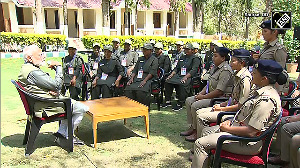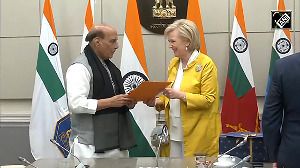"One reason Indian companies are suddenly growing abroad is that they can," Time magazine said in an article 'India Takes on The World' in its latest issue. The Time article, which warns big companies to beware of "that Elephant in the room, (it) may be an Indian competitor looking to buy you out," comes ahead of the World Economic Forum's annual India Economic Summit -- an event that allows companies to network and strike multi-million dollar deals in closed-door meetings.
"In the first 10 months of 2006, Indian companies cut more than $10 billion worth of cross-border deals, up from about $1 billion in all of 2000," the magazine said. This figure represents twice as much as foreign companies have invested in India, according to Dealogic, which tracks global merger and acquisition activity. Tata Steel's $8.1 billion bid to acquire Corus finds special mention.
The companies derive their boisterousness from a decision the government took over 16 years ago -- that of opening up the economy.
"In the early 1990s, the government began to slowly open up the economy. Anticipating an eventual onslaught from outsiders, the country's more far-sighted industrialists decided to modernise their operations.
As a result, the most efficient businesses were able to reap outsized profits," opines Delphine Cavalier, a Paris-based economist at BNP Paribas.
"Today, with competition now mounting in India, those same groups are seeking to protect that profitability by taking their activity abroad, knowing that continued economic growth in India will provide a strong base for years to come," Cavalier was quoted as saying by Time.
The magazine said the government's decision last year to double the cap on how much Indian firms can invest abroad to 200 per cent of a company's net worth is also a reason behind the recent buying spree of India Inc.
Besides, India-born business executives are climbing the corporate ladders at well-known multinationals, some to the highest rungs, it noted.
"There is a real bullishness" among the leaders of Indian industry, India-born co-founder of Hotmail Sabeer Bhatia was quoted as saying. It said from 2002 to 2006, India made 176 investments in Europe, against 114 by China over the same period.
Noteworthy investments this year by an Indian or India- born entrepreneurs include the $33.5 billion takeover of Luxembourg-based Arcelor by NRI L N Mittal's Mittal Steel,
Videocon's $291 million purchase of Thomson (France), Suzlon Energy's $565 million buyout of Hansen Transmission (Belgium), Dr Reddy's $572 million acquisition of Betapharm (Germany) and Tata Tea's $677 million purchase of Energy Brands (US).
Though obstacles to expanding overseas remain like in the case of Mittal's purchase of Arcelor, it felt that India's forays abroad have so far proved less controversial than those launched from other emerging economic superpower China.
According to Sanjaya Baru, media adviser to Prime Minister Manmohan Singh, that was because major Chinese companies are usually partly or wholly owned by government entities. "Private companies in India are private... They are not an extension of the government," he said.




 © 2025
© 2025